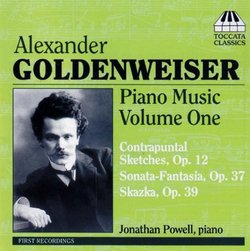What a Discovery!
J Scott Morrison | Middlebury VT, USA | 02/06/2009
(5 out of 5 stars)
"I only knew of Alexander Goldenweiser (1875-1961) as one of the towering figures of the early 20th-century Russian school of pianists. He was roughly contemporaneous with such giants as Rachmaninov, Medtner, and Goedicke and after a brilliant concert career focused primarily on teaching. Among his pupils were Lazar Berman, Nikolai Kapustin (whose music is just now becoming known in the West), Tatyana Nikolayevna, Samuil Feinberg, Grigory Ginzburg and Dmitry Kabalevsky. Few people knew that he was a composer -- he was modest about his compositions and didn't often play them in his own recitals -- and indeed the performances on this CD are first recordings. So it is all the more startling and wonderful to hear these remarkable pieces played here by Jonathan Powell who, as it happens, studied with another of Goldenweiser's students, Sulamita Aronovsky.
The disc begins with two late works. Skazka (Folk Tale), Op. 39, was published in 1961. 'Skazka' as a term for a musical piece originated with Medtner. Goldenweiser's Skazka is a seven-minute mosaic of short sections that are interrelated and highly charged with romantic harmonies and counterpoint. Sonata-fantaziya (Sonata-Fantasia), Op. 37, dates from the late 1950s and was written in memory of Goldenweiser's life-long friend, Alexander Goedicke. It is subtitled 'Skorbnaya pesn' ('Song of Sorrow') and is a dark and somber work whose harmonies are a good deal more starkly chromatic than those of Skazka. It is also quite contrapuntal and one is reminded that Goldenweiser's main teacher of composition was the great contrapuntist Sergey Taneyev.
The big discovery here, though, is the set of twenty-four Contrapuntal Sketches, Op. 12, dating from the early 1930s. It is probably the first set of pieces by a Russian composer in each of the major and minor keys modeled on Bach's Well-Tempered Clavier. It predates Shostakovich's great set of Preludes and Fugues, Op. 87 by about twenty years. It differs in its layout in that there is one piece per key -- unlike Bach's or Shostakovich's set which have a prelude and fugue in each of the keys -- following the repeating pattern of prelude, fugue, and canon. The first twelve pieces (designated Book I) are generally in two voices, those in Book II being more complex, having as many as four voices. There is much formal inventiveness, especially with a kind of mosaic form. There is frequent use of folk-tinged melodies -- Goldenweiser was a wonderful melodist -- in Nos. 3, 10, 13, 18, and of widely variable harmonic devices, with diatonic, virtually atonal, and highly chromatic harmonies cheek by jowl, as in Nos. 7, 19 and 23. There are several extended and complex pieces such as Nos. 17 and 22. Particularly engaging is No. 24 which juxtaposes serene chorale sections with complex canonic sections. I found myself listening again and again to the Contrapuntal Sketches and wondering why they haven't become piano recital or recording staples. They deserve to be. One hopes this recording will spur interest in them.
Jonathan Powell is a hugely talented British pianist who specializes in the music of late Romantic composers, particularly those from Russia. This is the first of his recordings that I've heard and I'm impressed with his technical polish, particularly his ability to limn contrapuntal strands while maintaining a singing tone, and his musicality.
Strongly recommended for those who love late romantic and early twentieth-century piano music like that of Taneyev, Rachmaninov, Medtner, Scriabin and their brethren.
Scott Morrison"


 Track Listings (26) - Disc #1
Track Listings (26) - Disc #1